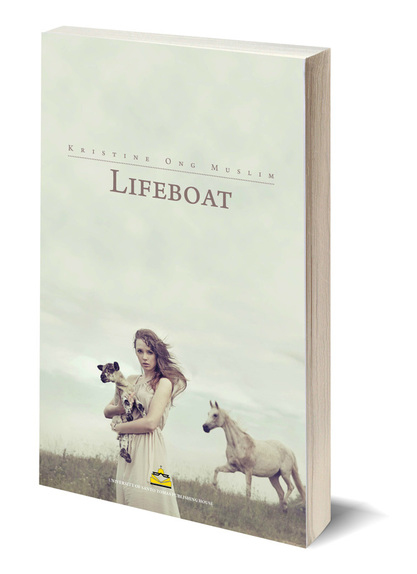
LIFEBOAT
University of Santo Tomas Publishing House
Manila, Philippines
Trade paperback, 109 pages
ISBN 978-9715067713
Publication Date: December 2015
List Price: $18.00
Cover art by Can Stock Photo Inc./Konrad Bak
Cover design by Jhozelle Crooc
BUY
direct from the publisher • Mary Martin Booksellers
Praise for LIFEBOAT
"Kristine Ong Muslim’s haunting collection, Lifeboat, solidifies Muslim’s reputation as a poet of loss, of absence. In “The Alchemical Stages,” the speaker invites readers to enter one of the most brilliant poetic minds writing today, “Here is disillusionment. Here is isolation. Peer inside its shell. Then tell us what you see . . . .” In the poem “Twilight does not grow overnight,” she writes that, “The coroner, who must’ve seen it all, / …does not avert his gaze from a spot / on the floor as if he is waiting / for a love poem to materialize / under the stainless steel table.” Muslim finds beauty in the most unlikely of places and creates a world unimagined since the time of the surrealists."
--Shaindel Beers, author of A Brief History of Time and The Children’s War and Other Poems
"The often surreal, always sharp poems in Lifeboat accumulate to a haunting whole. Here, among destruction, “the children in my town chose names / for their favorite colors.” Hope, like imperfect light, finds the cracks: “Love is that mute and shapely device / that cannot teach, that only lives in / houses with crooked teeth.” A fine, transformative collection."
--Nick Ripatrazone, author of Ember Days, We Will Listen For You, Good People, and many other books
Press and Reviews for LIFEBOAT
Press and Reviews for LIFEBOAT
"The poems in Lifeboat feel haunted. Although the syntax and vocabulary are exceptionally straightforward, the imagery and tone leave the reader unsettled. Things are not as they seem—the poems describe horses “that thump the oceans flat,” spiders as “the stuff made of time,” companions disguised by fog. Deceptively accessible, the language of the poems hovers above a suggestive depth of meaning. Word by word, readers understand the sentences, but poetic language is nothing if not figurative, and the metaphors here disconcert. The poems are memorable, therefore, not only through their striking imagery but also through the emotional resonance."
—Lynn Domina
"Entirely quotable and filled with verse that reminds readers why we should read poetry in the first place, the collection, while venturing abstract, a collusion of dream and dare, also hits hard...."
—Michael Prihoda, After the Pause
"... the language in Muslim’s poems is simultaneously unstable and perfectly balanced, both solely ours and utterly foreign, just like a little lifeboat in this infinitely surreal modern world."
—Jennifer Swanton Brown, The Literary Nest
"Big concepts are drawn in particular ways that feel almost, but not fully, recognizable. These poems are enigmatic, wandering souls."
—Mary McCray, Big Bang Poetry
"While this collection of poems divided into eight sections does have elements of the otherworldly, the type of haunting present is very much one of what haunts us as we live. Nightmares, lost connections, illness, the grit and grim of life paired with secret selves that harbor sadness, loneliness, and destruction are all present in this collection."
—Amanda Roper, Fig and Thistle
Sample Poems from LIFEBOAT
The Ghosts of the Strange Horses
They are still out there, trampling
through the fog. The grass
forever cold under their hooves.
By midmorning, the world is so
visible you would have wished
for blindness. Languages fill
our mouths, our throats with
different words for hope. If not
for silence, we would have
choked long ago. The horses
arch their backs sometimes.
Hunger can do that. Happiness, too.
There will be no other life like this.
(first appeared in Narrative Magazine, Winter 2009)
Hunger Strike
Strange how we do not alter ourselves
to fit the dimensions of this room
in order to fill it completely.
Through the years, the floor, which is
also a wall, has been hiding our tracks.
The invisible tracks lead out to the yard
where the grass is impossibly overgrown.
We can grow up, you see, learn new words,
read more books, fall in love more often
than necessary. Then perhaps, we can
move out and abandon this house,
this ghost town, and perhaps, perhaps
the world is not a swarm of houses after all.
We have our notions of childhood,
and they ache to be suspended in place:
how a house discredits itself
how a house wants to be rebuilt
Upstairs, we hold hands with the
versions of ourselves, the dead girls
who will live and live and live.
(first appeared in Potomac Review 49, Spring 2011)
